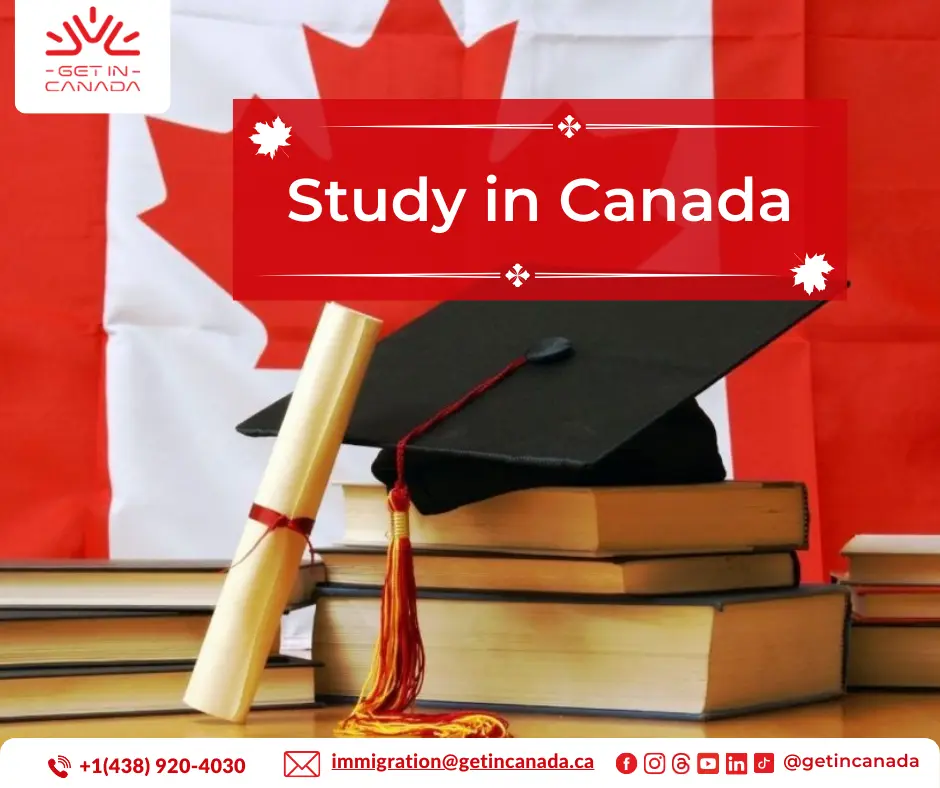Study in Canada
Studying in Canada is an inspiring and rewarding experience. You will be able to learn about different cultures, make new friends from all over the world, and see some amazing sights as you travel across this vast country. This guide will help you understand the process of studying in Canada.

Guide to Studying and Settling in Canada
If you are planning and looking forward to studying in Canada with an overall view of subsequently making a transition to permanent residence, then follow through with these steps.
Step 1: Choose Your Program
Research and find out the educational programs offered in Canada that will suit your interests and meet your career goals.
Step 2: Apply to a DLI
Apply to one of your preferred Canadian DLI institutions after choosing a program.
Step 3: Get a Study Permit
With a letter of acceptance and provincial attestation letter from the province or territory where your school will be located, Get in Canada can help you apply for a study permit from the Government of Canada, which is required to legally study in Canada.
Step 4: Exploring Immigration Opportunities
After you have completed your studies, Get in Canada can help you remain in Canada to gain professional work experience and then apply for permanent residence.
Find out if you are eligible to get in Canada →
Benefits of Studying in Canada
Canada has emerged as a potential destination for foreign students and currently hosts over 800,000 students worldwide. According to various studies, the major reasons international students come to Canada are as follows:
- High-Quality Education: Canadian educational institutions enjoy a great reputation globally.
- Job Opportunities: Work during and after study, with opportunities to immigrate.
- Bilingual Studies: Studies in English, French, or any combination of both are possible.
- Safety: This is a secure plot of land.
- Diverse Society: It possesses a very multicultural population, awaiting students and immigrants from nearly 200 countries annually.
- Affordability: Compared to other places of interest, Canada can be called more affordable. Add to it the fact that the Canadian dollar is far weaker than leading currencies like USD, GBP, and EURO, and the cost becomes lower in expenditure.
Guide to Universities and Colleges in Canada
It has more than 1,500 universities, colleges, and educational institutions accredited by Immigration, Refugees, and Citizenship Canada, which authorizes them to host international students. Known as Designated Learning Institutes, these institutes in Canada become the very gateway to educational sojourns and possible residency post-graduation in Maple Leaf Country. The validity of this ever-growing list of IRCC-approved DLIs needs to be checked on the official website of the Canadian government in each case before logging in.
These two provinces, Ontario and Quebec, the most populous in Canada, account for nearly 1,000 DLIs. With the diversification of DLIs across Canada, prospective students will likely be able to find programs that suit their goals and aspirations in education.
All Canadian universities maintain a high degree of educational requirements, which mirrors the commitments of the land toward ensuring equal and quality education for all students. Apart from universities, there are about 150 community colleges in Canada. These colleges offer career-oriented and practical education. Most of the universities concentrate on imparting theoretical knowledge and professional training in disciplines like medicine and engineering. In contrast, community colleges concentrate on applied training so that students can join the workforce as quickly as possible.
The good news is that both Canadian universities and colleges guarantee the same quality of education, which supports professional and even immigration objectives through the credentials foreign students receive upon graduation.
Canada’s Study Permit Regulations in 2024
New regulations by the IRCC will control the number of study permits being allocated in Canada. The total number of study permits set to come to Canada in that year is 360,000. These will be distributed to the provinces and territories in line with the student population of each. By March 31, 2024, provinces and territories will be required to establish application processes for the issuance of provisional attestation letters to students.
This cap does not extend to students pursuing their master’s or doctoral studies, nor does it extend to those studying at the elementary and secondary levels of education to become educators. Moreover, this does not apply to renewals within the study permit.
This will enable IRCC to ensure the country is constantly maintaining appropriate and sustainable levels of students coming from overseas, prevent quantitative misuse of the program, and ensure feasible accommodation provisions for the students coming to Canada. Under this new policy, IRCC will be providing part of the cap limit to the respective provincial and territorial governments, and thereafter, the distribution will be made to their designated learning institutions.
From January 22, 2024, a provincial attestation is to form part and parcel of all applications while applying for a study permit in support of approval to study in Canada.
These initiatives are the first to stay in order for two years, and IRCC is planning to re-evaluate the study permit numbers toward the end of 2024.
